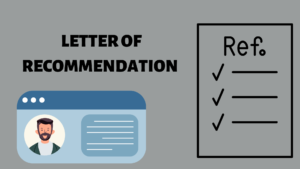
When requested to write a letter of recommendation, nobody loves to start with a blank page because even if you have a lot to say, you might need some assistance organizing your ideas.
Writing a strong letter of recommendation is crucial since references may influence how well a job applicant is considered. Your letter will provide support to the person you’re recommending and could perhaps help them get an offer. Keep reading to get tips on how to write one along with a free letter of recommendation template!
What is a Letter of Recommendation?
A recommendation letter, also known as a reference letter, as a succinct account of your interactions with someone, typically a previous coworker or student, in which you highlight their abilities or character. When requesting a reference for a job or college application, this individual could ask you for one.
Since you were requested to write a letter of reference for a former pupil or employee, they’ll undoubtedly anticipate that you will compliment their work. You might let them know you’re unable to submit a letter at this time if you’re unsure of whether you can genuinely suggest them or if you don’t remember your interactions with them very well.
Why is a recommendation letter important?
Not only is a reference letter necessary for college admissions, but it’s also frequently needed for job applications. For instance, you may be a graduate looking for employment with a global company. In this situation, you could be required to submit both a professional LOR from your former employer and an academic LOR from the college faculty.
Although LORs are not required, they do add value and raise the caliber of your application. A great letter of recommendation will be a crucial tool in helping you stand out from the competition whenever you submit an application, whether it’s for college admissions or a full-time job.
Because each LOR is written by a different person for a different person, each one is unique. This indicates that this paper will discuss another person’s perspective and experience working with you. These circumstances are singular and cannot be repeated. By sending a carefully customized LOR, you may take advantage of this and leave a lasting impact on the admissions committee.
How to Write A Letter Of Recommendation?
1. Purpose: Before you start your letter, you must keep in mind the objective of the letter as it will determine what information should be included. Your previous team member could be looking for a job, an internship, or a Master’s degree. What would this individual likely be interested in and to whom should you write the letter? You can incorporate the appropriate information by using the answers to these questions. For instance, it will be more beneficial if you mention how well your former team member performed on a machine learning project while working under your supervision if they apply for a machine learning education programme. Or, if you are aware that the position they want demands leadership qualities, provide more instances that are pertinent.
2. Consider the employee/student:: It’s beneficial to review their contributions to the world or your interactions with them. If they were a past pupil, they may have finished assignments under your guidance. You might go at any performance evaluations that were made of them if they were a previous team member.
3. Make your draft unique: Bring it to life. To provide context for each of your instances, use one or two phrases. Speak out for yourself. Any writing will be more powerful if it sounds real and natural. Be truthful. You can be questioned about the examples you gave by your former student or employee. Don’t make them appear better by adding extras because this could ultimately be discovered.
Types of Recommendation Letters(+Templates)
There are different types of recommendation letters which are frequently used by individuals which is why our team has created different kinds of letter of recommendation to help you get started.
1. BASIC FORMAT.
[Date]
I hope this letter finds you in good health, [Mr./Mrs./Ms.]
I’m writing to recommend [person’s complete name] for [purpose for why you’re recommending them].
I’ve known [person you’re suggesting] since [date] in [role you’ve had with the individual, e.g., “excellent buddy,” “coworker,” etc.].
I’ve always known [the person you’re suggesting] to be [characteristics the person possesses, such as “honest,” “loyal,” or “hard-working”].
I can suggest [person you’re referring] with confidence for [whatever you’re recommending them for] based on our shared experience.
Sincerely,
[Your Name
Signature]
2. PERSONAL RECOMMENDATION
Dear[Mr./Mrs./Ms.]
I’m writing to recommend [person’s complete name] for [purpose for why you’re recommending them].
I have known [the person you are suggesting] as a [friend, coach, neighbour, etc.] for [number of months or years].
In my opinion, [the person you’re proposing] possesses the following qualities: [honesty, kindness, ease of working with, etc.].
When [he/she] was [something particular he/she did that showed character], for instance, it is an illustration of [his/her] character.
I can enthusiastically suggest [person you’re referring to] for [what you’re recommending the person for] based on our shared experience.
Sincerely,
[Your Name
Signature]
3. ACADEMIC RECOMMENDATION
[Date Today]
Dear, [Mr./Mrs./Ms.]
I’m writing to urge [complete name of student you’re endorsing] to pursue [whatever it is you’re endorsing].
For [number of semesters, months, or years], I have known [Person you are proposing]. [He/She] attended [name the classes your kid has taken] as a student. We’ve also collaborated on [any further initiatives you two have undertaken].
I’ve known [the individual you’re suggesting] to be [characteristics the student possesses, such as “a diligent student” or “hard-working”].
I was really pleased by [his/her] work on [specific job or project undertaken] where [he/she] was able to [specific item he/she did].
I can safely suggest [student you’re recommending] for [what you’re recommending the student for] based on our experience together.
Sincerely,
[Your Name
Signature]
Recommendation letters complete an application. They achieve this by providing information on a candidate’s character traits, such as integrity, academic zeal, or leadership potential. A great letter of reference from a professor, therapist, boss, or coworker can help a candidate stand out from the crowd. It’s likely that at some point throughout your school or profession, you may be requested to submit letters of reference as part of an application. When you’re applying for graduate schools, this is especially true. It’s nearly usually a requirement of the application process to provide one or more letters of recommendation.
We hope you found this article helpful. Please don’t forget to leave a comment. All the best!


